| dc.description.abstract | Humans thrive, entertain themselves, and are built upon stories. Stories enable us to escape the cruel realities of our own world, whether it be sickness, fatigue, authoritarian regimes, or war. As these realities’ opposites we find dashing heroines, legendary creatures, adventurous plots and foretold prophecies of kings and queens, alongside inspiring stories of people in our own world. A central question which has occupied both philosophers and storytellers is whether or not humans are locked into a predetermined pathway, a certain fate, or if we possess free will in our endeavours. O’Conner points out that when we assess the significance of free will, “we are forced to consider questions about (among others) rightness and wrongness, good and evil, virtue and vice, blame and praise, reward and punishment, and desert” 1, all of which are traditional central opposites in storytelling.
The ongoing post-war era of contemporary literature is broad, and has enabled us to escape the cruel realities of our own world through the opposites O’Conner described. In the case of C.S Lewis’ series The Chronicle of Narnia, and its most popular work The Lion, the Witch and the Wardrobe2 (LWW), readers are alongside the Pevensie children sucked through a magical wardrobe portal and transported into the realm of Narnia, which stands as an escape from their war-inflicted lives. In Narnia, the arrival of Peter, Susan, Edmund, and Lucy is expected, and needed, in order to bring forth the Golden Age, led by the King of the forest, Aslan. A prophecy foretells that the children will end an eternal winter, but they are unaware of how they will fulfil this destiny. In another literary universe and time period, in The Time Travelers Wife3 (TTW), we follow Henry DeTamble, a man born with a genetic disorder which flings him back and forth in time beyond his control. Henry does not know where or when he will time travel, but he follows the pre-set timeline of his life, including the timeline of his future wife, Clare. Unlike the tale of the Pevensie children, the readers do not experience the same display of heroism or a prophesised greatness in the unpredictable life of Henry. This leads to an important question: if all our lives are predestined, why are some protagonists predestined to greatness and others to suffer? In this essay I will use the stories of C.S. Lewis and Audrey Niffenegger to combine the philosophies of Western philosophers with the doctrines of contemporary storytelling and discuss the following thesis question: how do stories reliant on predetermined narratives affect the readers' morals and thoughts on virtue through their protagonists? Firstly, I will briefly discuss the main views upon hard determinism versus libertarian free will and compatibilism. How do philosophers, scientists and Christians view human actions or choices? Next, I will explore storytelling and their deterministic nature. Do readers find comfort in how predetermined lives are unfolded? Followingly, I will study the books’ analogies, how Lewis’ Christian values are juxtaposed to Niffeneggers’ expressions of desire and personal fulfilments. Then I will explore and compare how the protagonists’ character and morality are portrayed and intercepted by readers. Lastly, I will present a conclusion to my thesis. | en_US |
